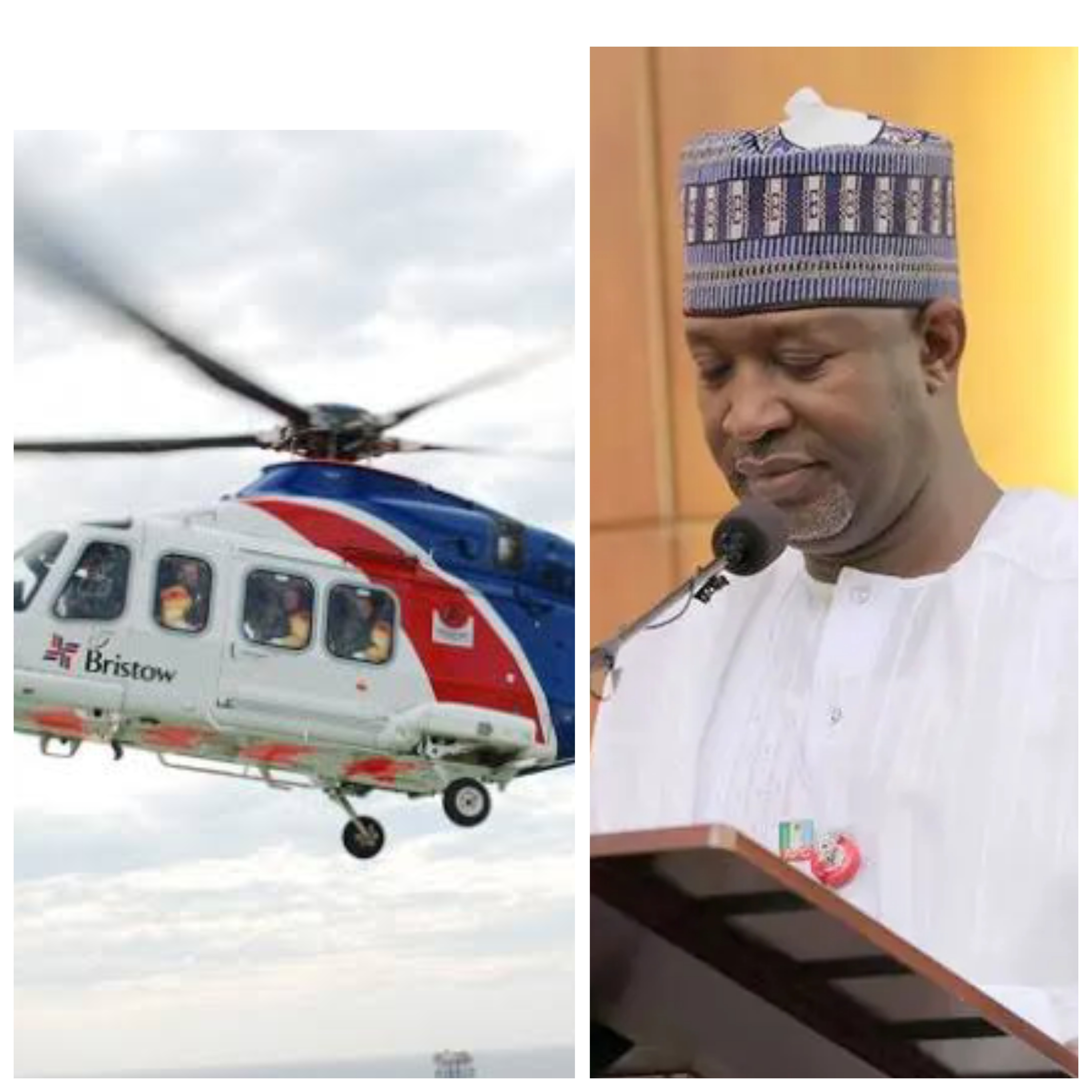Aviation
How The Helicopter Landing Fee Policy Will Affect The Industry

The Nigerian government’s decision to introduce landing fees for helicopters operating in the country’s airspace has raised concerns about the potential impact on the aviation industry.
While some welcome the move to generate more revenue, others are unsure of its impact on the already struggling sector.
As operators and users adjust to the new regulations, it remains uncertain whether the fees will result in increased costs for customers.
The federal government announced its plan to charge landing fees for helicopters operating within the country’s airspace to increase revenue generation in the aviation sector in March 2023.
The Minister of Aviation, Hadi Sirika, also inaugurated a new batch of Helicopter Monitoring Officers at Port Harcourt International Airport, who will be responsible for monitoring and collecting these fees. The officers will also monitor all helicopter take-offs and landings across Nigeria.
The introduction of a landing fee for helicopters, is part of the government’s efforts to diversify its sources of revenue and reduce dependence on oil.
The policy is also expected to promote safety and security in the aviation industry by regulating the activities of helicopter operators in the country.
However, the new policy is likely to have a significant impact on customers who use helicopters for transportation, especially in the oil and gas industry.
The additional fees are expected to increase the cost of transportation for customers, who may have to pay more to cover the landing fees.
In all likelihood, the new policy may also affect the operations of helicopter companies in Nigeria who may be forced to reduce their operations or increase their prices to cover the additional cost which could eventually lead to job losses and a decline in the industry.
Despite the potential negative impact of the policy on customers and the industry, the government believes that the introduction of landing fees for helicopters is necessary for the development of the aviation industry in Nigeria.
The introduction of these landing fees for helicopters in Nigeria is a significant policy change that will have far-reaching consequences for customers and the industry.
While it is aimed at generating revenue and promoting safety, it is important for the government to consider the potential impact on customers and the industry as a whole.
Aviation
Why Oyedepo’s Jet Can’t Leave Private Airstrip Without Govt’s Clearance – Keyamo

The Minister of Aviation and Aerospace Development, Festus Keyamo, has highlighted that every aircraft flying into or out of Nigeria, including those belong the military and influential individuals or corporate bodies, must first secure the clearance of relevant agencies.
Keyamo made the assertion on Sunday, as he featured as a guest on Channels Television’s Politics Today.
The minister specifically mentioned the Founder and Presiding Bishop of the Living Faith Bible Church Worldwide, Bishop David Oyedepo, while making the clarification.
Recall that the House of Representatives had called for a revocation of airstrip licences issued to certain individuals and private organisations, including Oyedepo’s church, citing security reasons.
ALSO READ: Bishop Oyedepo Reveals The Reason Behind His Fleet Of Private Jets
However, Keyamo insisted that there was no way a plane or drone, even if it belongs to the military, can leave or come into Nigeria without first getting a nod from the relevant aviation agency.
On if the airstrip of Oyedepo would also be subject to the same due process, Keyamo nodded.
In his words, “Oh yes, absolutely. That’s no problem. They were only concerned about the fact that they thought that somebody can take off from a private airstrip and fly out of Nigeria or fly into Nigeria. It is not possible.
“You must land in an international airport first. Then the Customs, immigration and NDLEA will process you before you take off from there to your private airstrip. If you are also flying out, you must land at an international airport. You will go through Customs, immigration and all the normal process before flying out.
“So nobody uses an airstrip for any such purpose without seeking clearance. At every point in time, the authorities must approve.”
On the number of airstrips Nigeria is operating at the moment, Keyamo said they are in the range of 40.
“We have a number of them, more than 40. For the federal airport, we have 23. The state airport has about eight or nine now.
“And then, the airstrips are about 40 or thereabouts. I have been there myself,” he stated.
Aviation
NCAA Cracks Down On Pilots Working For Multiple Airlines
The Nigeria Civil Aviation Authority (NCAA) has announced stringent measures against pilots and crew members who work for multiple airlines concurrently, a practice it describes as a serious safety violation.
In a letter dated November 6, 2024, Acting Director-General, Chris Nojomo warned that pilots operating for more than one airline without specific safety protocols pose significant risks to Nigeria’s aviation sector.
READ MORE: Obasanjo Visits Ondo Gov, Offers Support Ahead of Election
The directive, titled “Prohibition of Ad-Hoc Flight Operators for Multiple Airlines,” noted that NCAA surveillance reports revealed multiple cases of unauthorized cross-airline work by flight crews, which the agency now plans to address.
According to the NCAA, simulator and proficiency checks endorsed on a pilot’s license are valid only for the specific airline and training program under which they were issued.
The letter stated, “With effect from the date of issuance of this directive, all operators and holders of pilot licenses are informed that this action will be treated as a violation of the Nigeria Civil Aviation Regulations.”
The NCAA’s new policy, effective November 11, 2024, warns that violators will face strict enforcement actions. Moving forward, simulator renewals will also be filed directly with individual operators, further tightening the agency’s oversight.
Aviation
Akwa Ibom Boosts Ibom Air Fleet With Two New Aircraft
In a bold step to strengthen Akwa Ibom’s position in Nigeria’s aviation industry, Governor Umo Eno announced the addition of two new Bombardier CRJ900 aircraft to the fleet of the state-owned airline, Ibom Air, on Friday.
The two aircraft, registered as 5N-CED and 5N-CEE, mark a milestone in the state’s commitment to strategic investment, with the governor stressing that the acquisitions were fully funded by state resources without loans from financial institutions.
READ ALSO: FCTA Allocates N9.8bn To Upgrade Abuja Airport’s Presidential Wing
At a welcoming ceremony attended by local officials and residents, Governor Eno emphasized his administration’s mission to drive revenue-generating ventures for Akwa Ibom rather than relying on debt.
He called the move a step toward breaking the cycle of government investments that only serve to pay off loans, vowing that the state’s funds would go towards projects that bring returns to the people.
The governor challenged Ibom Air to turn a profit by 2025, stating that the airline’s management should ensure routes in and out of Uyo remain dependable to prioritize the needs of Akwa Ibom travelers.
“As long as I remain governor, we will continue to use state funds for the benefit of all, not for private gain,” he said, noting that his administration aims to ensure that public investments deliver real value to the state.
Governor Eno also provided updates on several ambitious state projects, including an 18-story commercial complex underway in Lagos and an upcoming 4-star hotel in Abuja, both designed to generate revenue for Akwa Ibom.
Plans for an international market in Ikot Ekpene and the phased opening of a new terminal at the Victor Attah International Airport were also announced, with the airport terminal set for partial operation by December and full activation in early 2025.
Speaker of the Akwa Ibom State House of Assembly, Udeme Otong, commended Eno’s financial management, highlighting that the administration has avoided seeking loans over the past 18 months despite launching significant development projects.
Ibom Air’s Chairman, Pastor Imoabasi Jacob, expressed appreciation for the state’s investment in the airline, which has seen its fleet grow to nine aircraft.
Jacob credited the governor’s support with enabling Ibom Air to boost flight capacity, meeting demand on popular routes such as Uyo-Lagos-Abuja.
Captain Mfon Udom, CEO of Ibom Air, stated that the expanded fleet will improve efficiency and allow the airline to scale up its operations in time for the Christmas travel season.
Udom also noted that the airline anticipates the delivery of nine additional Airbus planes, which will further strengthen Ibom Air’s market presence.
Traditional leaders, including HRM Edidem Ita Edet Okokon III of Okobo Local Government Area, lauded the governor’s leadership, pledging continued support from the traditional institutions.
Anie Essienette, Group Manager for Marketing and Communications at Ibom Air, noted that demand for the airline’s services has surged nationwide, with the new CRJ900 aircraft helping meet this increasing need while the airline awaits further fleet expansion.










